D Day
r.jpg)
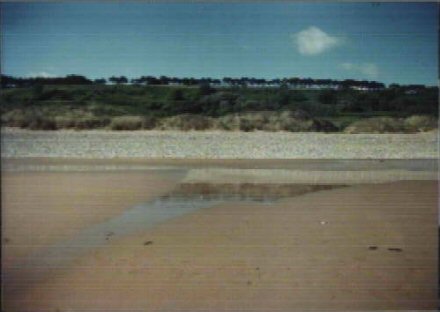
Easy Red Beach is quiet now and as I reflect back on the momentous events of that fateful day, I suffer a nostalgic solitude with memories of a by gone era. The pervasive stillness is broken now only by the soft roll of the unrelenting surf. But, if you listen carefully, the surf beats a melancholy cadence to a hundred thousand pounding boots from a far distant past, echoing across a now desolate beach. For those of us who were there, we will not have too many tomorrows, but each of us, in his own way, will remember that sound and keep it reverberating around the world until the last of us joins that Heavenly Host. We must all, forever bear in mind what occurred on that historic date so long ago, for the lamp of freedom very nearly failed. We owe so much to those brave heroes watching over this beach in silent vigil.
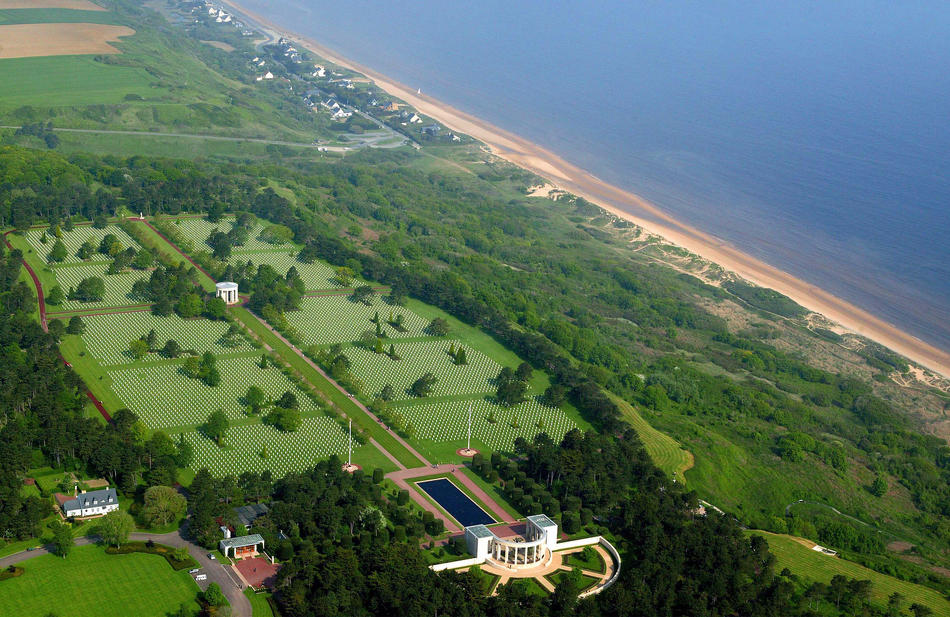
Their memory and what they sacrificed in the cause of freedom must become self perpetuating through our children and theirs and generations yet unborn so that this terrible catastrophe is never again visited upon humanity. As a reminder, I carried home a few handfuls of that sacred sand and would be proud to share it with anyone who really cares. The rest will be joined with my ashes and spread over the ocean and I will once again join my,
Band of Brothers.
My name is William George Pepe, I live in Hampstead NC with my wife of over 60 years. I am a veteran of WWII with my most notable contribution to the war effort being a member of an assault team that landed in Normandie on D Day at the Easy Red sector of Omaha Beach.
At that time, I was a 2nd Lieutenant assigned to Headquarters Company of the Fifth Engineer Special Brigade.
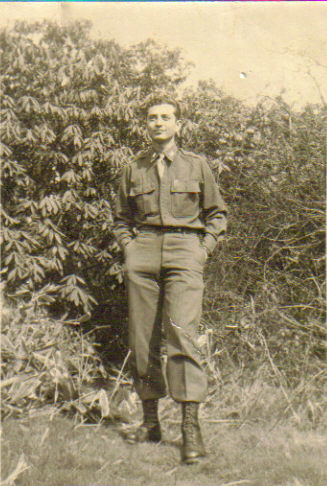
An organization of which very little was written and yet, played an extremely vital role in the liberation of France. Our TO carried 6000 men and with attached units, our strength was in excess of 12,000 people, mostly, combat engineers who fought, with distinction as infantry, along side of the 1st Infantry Division. It was our assigned mission to support the infantry by carrying them to the beach and then getting them off as expeditiously as possible. We were activated for that one specific purpose and once that mission was accomplished, we would cease to exist as an entity. We had no history or heritage, we had no battle flags but our history would be written, for all time, on that one fateful day. We have nothing to mark our passing except for those who lie forever still as a tribute to freedom and a simple monument overlooking that costly beach.
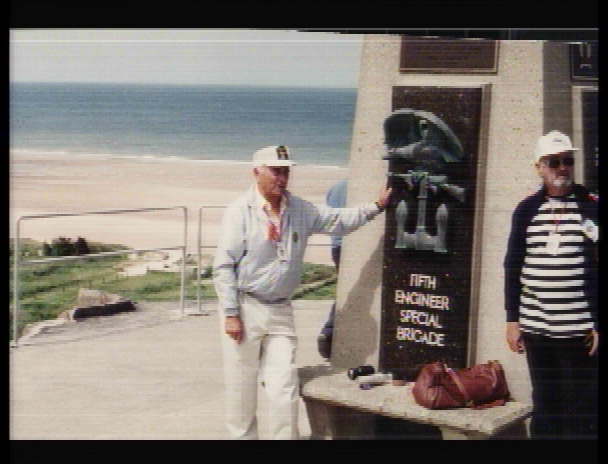
We received no public acclaim but were recognized by those who mattered by being awarded the Presidential Unit Citation, the Free French Croix de Guerre, avec palme and the Belgian Croix de Guerre. Most recently, at the 60th anniversary commemoration of the landings in northern France, I was knighted by the French government with investiture into the French Legion of Honor with the title and rank of "Chevalier".
As a member of headquarters staff, I was privy to much of the planning as it concerned the 5th brigade and it's subordinate groups. we spent a lot of time over maps and sand tables planning specific tasks and the one pervading concern that troubled our senior commanders was the absence of natural cover in the immediate beach areas. the Air Force assured us that after they had dropped 100 tons of bombs for every 500 sq. yds. of beach, we would have craters in sufficient numbers to protect us from enemy fire. We were somewhat assured but were soon to learn that our confidence had been sorely misplaced. What should have been a relatively text book landing soon became a disaster of major proportions far beyond the control of the assault troops. The invasion very nearly failed due to three inexcusable, critical blunders that I have categorized as the three "I"s. INTELLIGENCE, INCOMPETENCE and INDECISION.
(1) INTELLIGENCE In order to prevent the landing area from being compromised, all aerial surveillance of the landing areas was discontinued for a period of two weeks prior to the landing date. Within that time frame, Marshal Erwin Rommel, who was in overall command of the Atlantic Wall fortifications moved, into the Omaha Beach area, two infantry divisions for anti invasion maneuvers. They may not have been of front line caliber, but anyone pointing a loaded gun at you becomes a formidable enemy. The highly publicized Free French Marquis, upon whom we so heavily relied to keep us informed of any significant changes in German troop movements and deployment, failed to report the addition of these troops, primarily because of their own internecine struggles for supremacy within their infrastructure. They also failed to inform us of the removal of the heavy bore artillery in the Pointe du Hoc area, which resulted in the wholesale decimation of Rangers in pursuit of phantom guns. they did not inform us of the asparagus, ( poles planted in open fields to discourage glider landings). they did not tell us that the Germans had flooded the area around Ste Mer Eglise, the area designated as drop zones for the paras. communication with the French underground was practically non existent. we went in blindly and paid a heavy price.
(2) INCOMPETENCE I hit the beach at about 8:30 am and the scene can only be described as a page from an apocalyptic nightmare. The dead and dieing were everywhere. there did not appear to be a cohesive chain of command. The craters we so desperately needed for personnel protection and command positions were nowhere to be found. We were absolutely, nakedly exposed to enemy small arms and artillery fire.
The Air Force had failed us, miserably. I might add, that we found the craters two days later, five miles inland and a proliferation of dead cows. We had some shallow indentations on the beach from small bore shellfire from destroyers that paralleled so closely to the shore, they must have scraped bottom with their keels, but these were woefully inadequate for personnel protection.
The overall battle plan had units landing in designated, predetermined areas but the enemy fire was so heavily concentrated in the Easy Red sector, many of the small boat operators sought out landing zones where the fire was not quite so intense. This resulted in wholesale confusion with fire teams being deposited in unfamiliar areas and more importantly, no immediate contact with senior commanders. Also contributing the general chaos was someone's brilliant idea to have all officers wear a vertical strip on the rear of their helmets and NCOs, a horizontal stripe. and this after we were instructed to remove all physical indications of rank. It did not take long for the Germans to determine who was in command with the resultant inordinate number of casualties among junior commanders. With little or no organization on the beach, we stagnated to the point where Gen Eisenhower seriously considered removing the survivors from Omaha beach and concentrate our efforts at Utah Beach where resistance was relatively minimal. I believe the reason that order was not initiated was that he could not find any cohesive command structure to whom he could administer the order. It was Col George Taylor and not General Cota who projected this grim observation, "Men, in a short while, there will be only two types of people on this beach. Those who are already dead, and those of you who are about to die." With the incoming tide at our heels and the enemy to our front, there was no alternative but to go forward or drown. We won that beach, not through any brilliant stroke of strategy but purely on the instinct to survive. Up and down the beach, there were incredible acts of individual bravery but these feats, alone, did not win the beach. It was won by frightened, green, kids, most of whom were facing enemy fire for the first time. In combat, the battle plan is immediately discarded when the first bullet is fired and you are forced to adapt to battlefield conditions. With combat teams scattered along the entire 7600 yds of Omaha Beach, chaos and confusion ruled the day. Ranking NCOs, with no overall chain of command, adjusted to field conditions, and formed individual combat teams. These men did not want to die and did what they had to do. They went forward because there was no going back.
(3) INDECISION Consistent with the anti invasion maneuvers, the Germans had armor in place in sufficient numbers to repel our invasion. However, they were not permitted to deploy these units without the express orders from Hitler. He was known to work well into the morning hours and on June 6th, as the invasion was taking place, he was well into the land of nod. Since no one wanted to incur the well known wrath of the Feurher by awakening him, the battle was allowed to progress with out the commitment of far superior panzers. Also, Von Runstad was not convinced the invasion was for real, thinking the main thrust would come in the Calais area.
The Allied Forces made a feeble attempt to land tanks early in the afternoon of D Day with disastrous results. They were launched well off shore from LSTs and had to battle a surging tide to attain solid ground. But here again, some armchair genius thought to place an inflatable donut around the tanks. The Germans found that a ten cent, 30 caliber bullet could take out a tank by puncturing the flotation device. I watched 23 out of 24 tanks perish along with their crews.
In closing, I should like to take one more swipe at the vaunted Air Force. We dropped two divisions of paratroopers in what was supposed to be the Ste Mer Eglise area behind the Utah Beach with the intended objective of a link up with troops coming ashore. The Air Force employs a procedure known as "pathfinders". These people are generally the most qualified navigators in the group and it is their task to locate and delineate the drop area so that following flights might identify the targets. Here again, they failed in this relatively simple task resulting in a wide dispersal of paratroops miles from the intended objectives. We probably lost more troops to drowning in flooded fields than from enemy fire. You might conclude that I am no big fan of these pampered glamor boys who went to sleep in a clean, dry bed every night after their medium rare, steak dinners, particularly since my unit fell victim to these guys bombing the wrong side of a smoke line at St Lo.
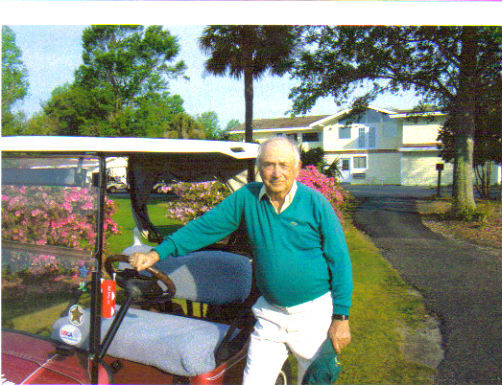
william george pepe - chevalier